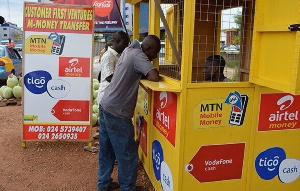 The E-levy is likely to affect mobile money users the most
The E-levy is likely to affect mobile money users the most
Of all the users of digital payment systems which will be severely impacted by the Electronic levy (E-levy) soon to be introduced by the government, mobile money customers will be those most heavily hit as data from the Bank of Ghana indicate no other platform comes close to it.
The Summary of Economic and Financial Data (November 2021) published by the Bank of Ghana shows the value of transactions on the mobile money platform as of October 2021 has reached GH¢80 billion, while the other payment platforms together – cheques, ACH direct debit, ACH direct credit, E-zwich, cash-link, GhIPPS instant pay and Internet banking – recorded transactional value of more than GH¢31billion, not even up to half the value of mobile money transactions.
Besides the value, when considering the number of transactions no payment platform comes close to mobile money. The data show 391 million transactions took place on the mobile money platform in October alone, whereas the number of transactions on the other seven payment platforms was a little over 8 million – very infinitesimal when compared to the mobile money platform. Again, active mobile money accounts for the period were 18.4 million – super higher than the number of accounts held by banks in the country.
What this essentially means is that there are millions of people using the mobile money platform to access financial services who are not using the banking system; hence, the proposed 1.75 percent E-levy by the government will largely affect the informal sector and the poor more than the rich.
Economist and senior lecturer at the University of Ghana Business School, Dr. Agyapomaa Gyeke-Darko, in an interview with the B&FT said this will derail the financial inclusion agenda, as the masses in the informal sector – who were initially apprehensive about using the platform especially because of the 1 percent service charge – will go back to the cash-based system they were used to; thereby defeating the cash-lite drive of the central bank.
“People who would ordinarily not be using formal financial services have resorted to the use of mobile money. And once they have resorted to the use of mobile money, it means, one, they have access to it; two, they are using it for their savings because they save on their wallets, and they are able to take loans and some even go on to subscribe to insurance on their mobile money”.
“So, people who would ordinarily not be using formal financial services are gaining access to these financial services – and getting them at an affordable rate; and so all these people are included in the financial services”.
“But levies when imposed increase the cost of goods and services. So when a levy is going to be imposed on mobile money transactions, it’s obviously going to be less attractive to people. And the very people that we seek to integrate into our financial sector are the ones that are going to go out; because gradually they are going to withdraw their funds from the mobile money wallets”.
“Once they do that, they will be excluded from the financial sector. Eventually, they will go back to the cash-based system and the traditional ways of saving wherein they keep monies under their pillows etc.,” she said.
The E-levy
Finance Minister Ken Ofori-Atta, last week in the 2022 budget presentation, confirmed the worst fears of many that the government has slapped 1.75 percent tax on all electronic transactions covering mobile money payments, bank transfers, merchant payments and inward remittances.
He justified this with the government’s effort to increase the tax base of the economy, given that only a handful of individuals and entities involved in economic activity are taxpayers.
“It is becoming clear there exists an enormous potential to increase tax revenues by bringing into the tax bracket transactions that could be best defined as being undertaken in the informal economy. After considerable deliberations, the government has decided to place a levy on all electronic transactions to widen the tax net and rope in the informal sector.
“This shall be known as the Electronic Transaction Levy or E-levy. Electronic transactions covering mobile money payments, bank transfers, merchant payments and inward remittances will be charged at an applicable rate of 1.75 percent which shall be borne by the sender; except inward remittances, which will be borne by the recipient,” he said.